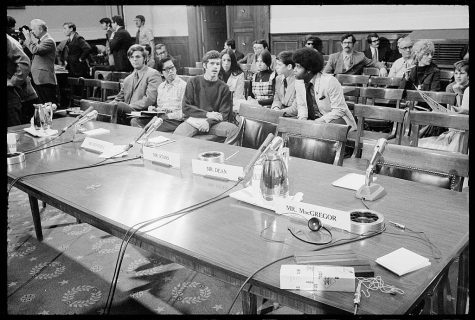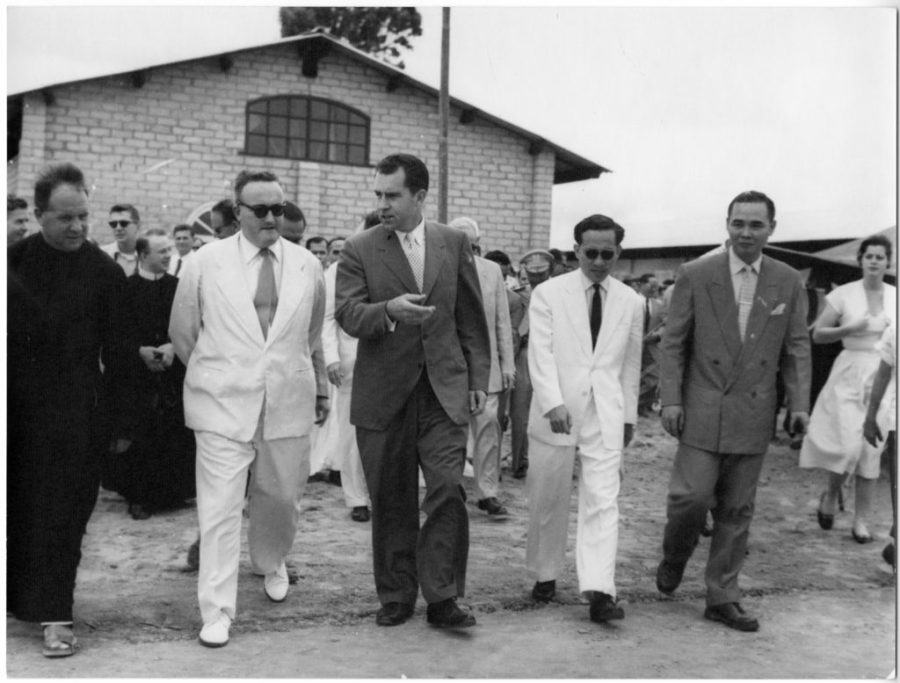From Break Ins to Breakthroughs
Watergate’s Impact on Government and Press, 50 Years Later
Planting Seeds of Controversy: Nixon touring facilities during his trip to Vietnam, at the of the war, January 7, 1956.
51 years ago, five burglars broke into the offices of National Democratic Committees headquarters at the Watergate Hotel. 50 years ago, the Washington Post revealed government involvement in the break in, as well President Nixon’s involvement in the scandal’s coverup. 49 years ago, Richard Nixon became the first ever president to resign from office.
Time Magazine cites Watergate as one of the biggest political scandals of all time.
The break in at the Watergate Hotel was a significant moment in American history, but it was equally important to the world of journalism.
1970’s America was filled with resentment regarding the Vietnam War. Following the release of the Pentagon Papers (documents proving the war could not be won by the U.S.) by the Washington Post, citizens made their disapproval public. Nixon retaliated against the Post in particular, barring them from entering the White House or speaking to any of its staff.
According to nyhistory.org, “The Nixon administration’s response to the Pentagon Papers was multifaceted. It took an openly antagonistic stance towards the press in general and the Washington Post and Katharine Graham in particular.”
The break in at the Watergate Hotel appeared, at first, to be a standard burglary; investigative journalism proved otherwise. Bob Woodward and Carl Bernstein of the Washington Post took an interest in the burglary, and discovered loose threads, indicating government involvement.
Over the course of three years, Woodward and Bernstein broke and covered the entire story, following tips from their whistleblower “Deep Throat” who was later revealed to be Mark Felt, former associate director of the FBI.
After following the movement of money from Nixon’s Campaign to Reelect the President (CREEP), the pair revealed that the Watergate burglars “were connected to President Richard Nixon’s reelection campaign, and they had been caught wiretapping phones and stealing documents” (history.com).
While Nixon was not involved in the planning of the break in, he was heavily involved in the coverup, creating what is arguably the most startling Presidential scandal in U.S. history.
50 years later, the Watergate scandal has gone down in history as one of the greatest government exposures ever, but even greater impacts were seen in politics and journalism.
“Nixon had always been surrounded by a cloud of controversy. Before the Pentagon Papers and Watergate, in 1952, Nixon gave a speech denying his misuse of political funds, and appealing to the American people to elect Eisenhower as president, and him as vice president. It worked. After the Pentagon Papers and Watergate, the public lost all favor with Nixon. His reputation never recovered,” says US History teacher, Mrs. Sarah DiGiacomo.
Watergate drew a line in the sand between government and press. Where the Pentagon Papers were kindling, Watergate set the fire.
Simultaneously, the belief of the people in the government plummeted.
“The public was incredulous. In the past, we put our politicians, especially our president, on a pedestal. As more and more people turned on Nixon, revealing the extent of his involvement, the disbelief turned to shame and anger,” explains DiGiacomo.
Eventually, more evidence came to light, thus incriminating Nixon, and public disapproval grew. On August 9, 1974, Nixon submitted a letter of resignation to congress, effectively ending his presidency. He was succeeded by Gerald Ford, who later pardoned Nixon of his charges.
Nixon’s pardon was equally unpopular with the public, and set a precarious precedent. The people receive the impression the politicians were untouchable.
According to DiGiacomo, “When Ford pardoned Nixon, the morale in the country plummeted to an all time low. It seemed the president was above the law… [he] was allowed to commit a crime, and was pardoned, despite obvious guilt.”
While the Watergate Scandal shed limelight on the US government, the scandal was transformative for the press.
Bob Woodward and Carl Bernstein, the reporters for the Washington Post who broke the scandal, demonstrated the power of investigative journalism and respect for source anonymity. Woodward and Bernstein exemplified the power of press and public knowledge; Woodward and Bernstein’s reporting of fact provided the public with the power to condemn what they believed was an inadequate White House from office.

Mrs. Jill Dion was a news editor and reporter for 30 years, at papers such as the Milford Mirror, the New Haven Register, and the Connecticut Post.
“I was a child when the Watergate scandal broke but I still remember the newspaper headlines because they were so large,” says Dion. “Watergate always served as an inspiration for reporters to dig for news and not give up on finding the truth. It gave us heroes in Woodward and Bernstein, who were really just two regular guys doing their job.”
Woodward and Bernstein served as an inspiration for rising journalists. Their resilience and faith in their story was greatly admired and appreciated by Americans.
However, Woodward and Bernstein also served as an example of the importance of source anonymity. Bob Woodward could acknowledge that revealing Deep Throats identity, thus proving his credibility, could make their earlier stories untouchable. Still, despite the delayed take-off of the stories, Woodward honored Deep Throat’s request, and their continued efforts led to one of the largest breakthroughs in journalistic history.
Dion says, “It’s a given that journalists will protect their sources, and the anonymity of Deep Throat serves as a constant reminder of that. Oftentimes government officials and others will share information and not want their name attached, and reporters know they have to honor that secrecy.”
Furthermore, Woodward famously said, “A reporter’s ability to keep the bond of confidentiality often enables him to learn the hidden or secret aspects of government.”
The legacy of Watergate has continued to influence the US 50 years later.
According to the Washington Post, “the combination of the ethics legislation, calls for more rigorous congressional oversight and the work of independent counsels has carried forward to the present day.”
Despite the turmoil in the government, the press was able to establish a newfound trust and credibility within society. Woodward and Bernstein became some of the first ‘celebrity journalists’, and continued to write and serve the public for the rest of their professional careers.
As Carl Bernstein famously stated, “You can’t serve the public good without truth as the bottom line.”
Your donation will support the student journalists of Foran High School. Your contribution will allow us to purchase equipment and cover our annual website hosting costs.
Hi! My name is Annabel Wardman and I am a senior here at Foran. When not busy working for the Mane Street Mirror, I enjoy sailing, reading, and spending...







